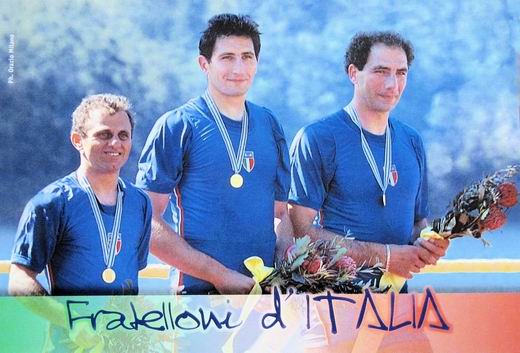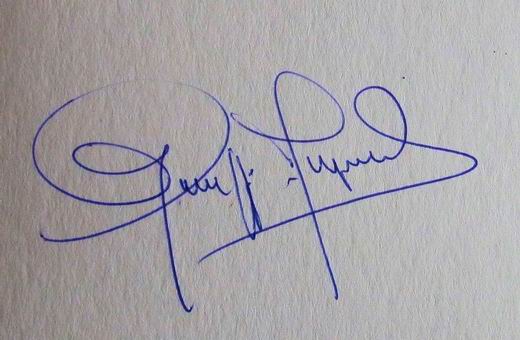Giuseppe Abbagnale
di Giuseppe Zingone
Abbagnale, una famiglia fucina naturale di atleti, che ha dato e continua a dare soddisfazioni ad un paese, l’Italia, assetato di vero sport, un Olimpo di medaglie raggiunto con disciplina e sacrificio. Tutto questo in un Sud che negli anni Ottanta si riscopre “Canottiere” e le cui parole più in voga sembrano essere “Due con”, una specialità che ci ha visto imperare nel mondo, uomini che hanno dato lustro ad una Città nella quale tutto parla di mare.
L’ascesa sportiva di Giuseppe Abbagnale è inscindibilmente legata a quella di suo fratello Carmine e del celebre timoniere Giuseppe Di Capua, un esempio che ha catapultato intere generazioni verso la nobile arte remiera, uno sport generoso, splendido, disinteressato. Non voglio esimermi dal citare anche Agostino Abbagnale il più giovane dei “fratelloni d’Italia” ed anche lui ringraziare per l’amore proferito a questo sport. Nel mio ultimo incontro con Giuseppe Abbagnale ho avuto modo di ascoltare parole amare, dovute alla difficoltà a portare avanti uno sport povero, poco rilevante a livello nazionale, privo di sponsor e di aiuti tesi a sostenere i mille sacrifici quotidiani della gioventù remiera stabiese e italiana, spesso il canottiere giallo-blu deve sperare di essere assorbito in un gruppo sportivo militare per continuare a VOGARE. Siamo certi però che le radici non ingannano anche se affondano in terreni diversi, auguriamo al nostro giovane vivaio stabiese di canottieri, tanti podi, quanti solo loro riescono ad immaginare, lì saremo anche noi.
Giuseppe Abbagnale nasce a Pompei il 24 Luglio 1959, diplomato in Ragioneria, nel 1983 diviene Insegnante di Educazione Fisica, oggi è impiegato presso la BNL (agenzia di Torre Annunziata).
Titoli ottenuti:
Campione Olimpico nel 1984 a Los Angeles, nel 1988 a Seoul, Argento Olimpico nel 1992 a Barcellona dove è stato anche portabandiera della delegazione Italiana ai giochi.
Campione del mondo di canottaggio nel 1981 a Monaco, nel 1982 a Lucerna, nel 1985 ad Hazewinkel, nel 1987 a Copenaghen, nel 1989 a Bled, nel 1990 in Tasmania, nel 1991 a Vienna.
Vice Campione del mondo nel 1986 a Nottingham e nel 1993 a Roudnice, terzo ai mondiali del 1983 a Duisburg.
Campione Europeo nel 1981 e primo Classificato ai Giochi del Mediterraneo nel 1991 svolti ad Atene.
Ininterrottamente Campione Italiano di canottaggio dl 1976 al 1995 con un totale di 30 titoli nelle diverse categorie e specialità.
Medaglia d’Oro al Valore Atletico, Medaglia d’Oro Thomas Keller (massima onorificenza per un canottiere)(1).
Cavaliere Ufficiale della Repubblica nel 1993, riconoscimento ricevuto da Oscar Luigi Scalfaro.
Consigliere con delega al canottaggio del Circolo Nautico Stabia dal 1996.
Presidente del Comitato Regionale della Federazione Italiana canottaggio nel 2000.
Vice Presidente della Federazione Italiana Canottaggio 2001-2004.
Collare d’oro al merito sportivo, con Carmine e Giuseppe di Capua nel 2015.
Allenatore di 2° livello iscritto all’albo.
Presidente della Federazione Italiana Canottaggio per il quadriennio 2013-2016, componente del Consiglio Nazionale del CONI, è stato rieletto per il secondo mandato il 27 novembre 2016 (quadriennio 2017-2020).
* * *
(1) Riportiamo integralmente il testo della Thomas Keller Medal, Written by Martin Cross 2004.
Giuseppe Abbagnale
Think ofan Olympic and World Champion oarsman who seems quiet, almost gentle on the outside, yet underneath has immense power and on top of that a heart which will allow him to face almost any challenge. There are two names that spring to mind: Steve Redgrave and Giuseppe Abbagnale. Between 1986-1988 as Redgrave tried to muscle in on Giuseppe’s territory of the coxed pair these two great rowers fought for superiority on the World Championship stage. At the end of some unforgettable races, the score between them stood at 2-1 to Giuseppe and his brother Carmine. It was their domination of the coxed pair’s event over ten years that saw Giuseppe together with brother Carmine win Thomas Keller medals in 1987.
Gianni Postiglione, who as a coach to the Italian team saw more than most of the gentle giant, remembers how Giuseppe could explode into action while under pressure on the water: “Giuseppe was like a lion, very aggressive, strong and powerful.” Perhaps this was not surprising for someone who lived in the shadow of Mount Vesuvius . Giuseppe had a physique to match his power paid for by hard labour. His father was a farmer, who obliged Giuseppe from a young age to help him work on the land round his farm near Pompeii . It built him up but meant that it was difficult for him to leave and spend time training.
Though rowing was not an obvious choice for Giuseppe, it soon became apparent how fast he could move a coxed pair and in 1981, his coach La Mura made him switch partners to row with his brother Carmine, who had just rowed as a junior. The two of them stormed to victory in the 1981 Championships.
If anyone thought it was a flash in the pan, they were to have a rude awakening, as the Abbagnale brothers stamped their personality on this ‘hard man’s’ event as no one has done before, or since. In thirteen years, they were to win the event nine times and add three Silvers and a Bronze to their medal tally. Their style was always to lead from the front and the lead they built up was more than just the sheer power that Giuseppe had available. Underneath, there was a silky smoothness to the way their boat moved.
These two qualities were most apparent in the Seoul Olympic of 1988, when Giuseppe’s boat headed Steve Redgrave’s pair to take his second Olympic medal. Postiglione remembers it well: “This was Giuseppe’s best performance, the boat was moving really well.” Performances like that had a big impact on the Italian team. Not only was Giuseppe a tremendous presence in the team, with a huge appetite for a demanding training programme but his success also helped rowing blossom in the south of Italy .
All this helped the Abbagnale brothers become national celebrities. It was a status and respect that Giuseppe was to retain, when he received over 90% of the votes in the Italian Federation’s election to become Vice President. The brother’s last Olympics in 1992 saw one of rowing’s most dramatic races ever, when another set of brothers from Britain , the Searles, cut down a huge Italian lead on the line. Giuseppe was as sporting in defeat as he was in victory: A role model for all those around him.



